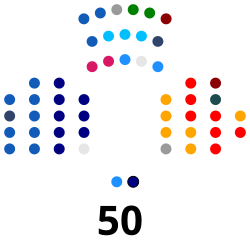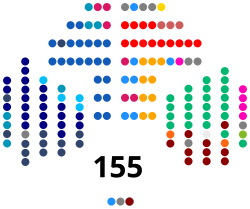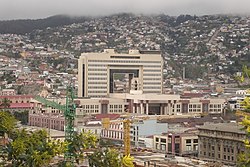National Congress of Chile Congreso Nacional de Chile | |
|---|---|
| LVI legislative period | |
 | |
| Type | |
| Type | |
| Houses | Senate Chamber of Deputies |
| History | |
| Founded | July 4, 1811 (First National Congress) |
| Leadership | |
| Structure | |
| Seats | Total: 205 50 senators 155 deputies |
 | |
Senate political groups | Government (18) External support (5)
Opposition (27)
|
 | |
Chamber of Deputies political groups | Government (67)
External support (7)
Opposition (81)
|
Length of term |
|
| Meeting place | |
 | |
| Edificio del Congreso Nacional Valparaíso Chile | |
| Website | |
| Cámara de Diputados (in Spanish) Senado (in Spanish) | |
The National Congress of Chile [1] (Spanish : Congreso Nacional de Chile) is the legislative branch of the Republic of Chile. According to the current Constitution (Chilean Constitution of 1980), it is a bicameral organ made up of a Chamber of Deputies and a Senate. Established by law No. 18678, [2] the city of Valparaíso is its official headquarters.
Contents
- History
- Patria Vieja
- Patria Nueva
- Dictatorship 1973-1990
- Transition to Democracy
- See also
- References
- External links
Chile's congress is the oldest operational in Latin America and one of the oldest in Ibero-America. The First Chilean National Congress was founded on July 4, 1811, to decide the best kind of government for the Kingdom of Chile during the captivity of King Ferdinand VII in the hands of Napoleon.
The Chamber of Deputies is composed of 155 deputies (Spanish:diputados) elected to four-year terms. Re-election is possible for a maximum of two times, which means that the deputy may remain in the post for up to 12 years. [3] The country has 28 electoral districts (Spanish:distritos electoral) which each elect between 3 and 8 deputies. [4]
The Senate is composed of 50 senators (Spanish:senadores) elected to eight-year terms. Re-election is possible at most one time, which means a senator can remain in the post for up to 16 years. [3] The electoral divisions of the Senate are different from those of the Chamber of Deputies. Each of the 16 regions of Chile forms a senatorial constituency (Spanish:circunscripción senatorial) that elects between 2 and 5 senators. [4]
The Congress's powers, duties and processes are defined in articles 42 to 59 of the current constitution of 1980 and through the Constitutional Organic Law No. 18918 [5] published in 1990.
The current electoral system (or voting system) in Chile is proportional and inclusive according to the 2015 update of the organic law No. 18700, article 179 bis. [6]
The National Congress was closed without an immediate renewal of the members of its two chambers during three periods: 1924-1925, June-October 1932 and 1973-1989.
A new four-years legislative period begins with the installation of the National Congress. The LVI legislative period of the Chilean Congress began on March 11, 2022 and will end in 2026.

